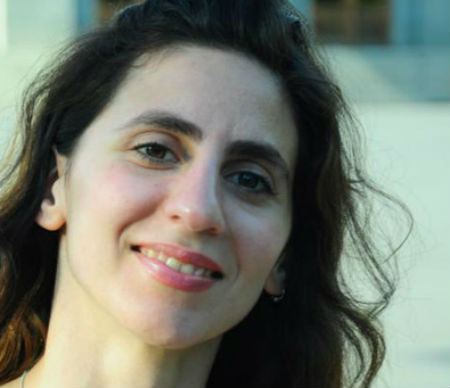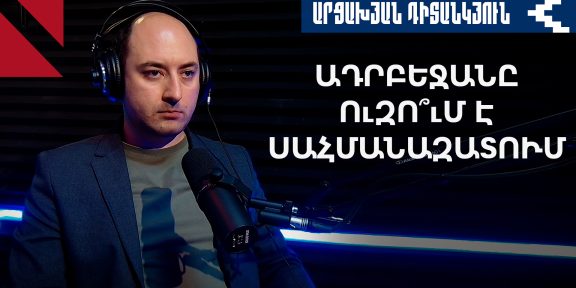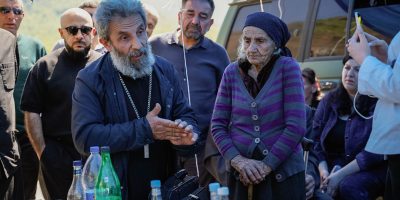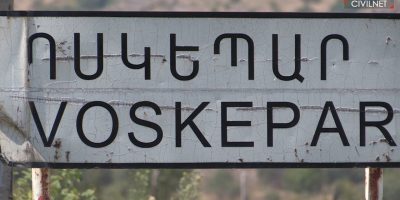 Agos, the Armenian bilingual weekly newspaper based in Istanbul, on the occasion of the 99th anniversary of the Armenian Genocide, published a series of letters written by well-known Armenians addressed to the Turkish people.
Agos, the Armenian bilingual weekly newspaper based in Istanbul, on the occasion of the 99th anniversary of the Armenian Genocide, published a series of letters written by well-known Armenians addressed to the Turkish people.
“It is always possible to rewrite history, sweep away the bloody foam of hate and become brothers not only in defeat but in the hope of an alternative road to the banalization of evil, to the silencing of crime and the clumsy ideological fundamentalism.” On the occasion of the 99th anniversary of the Armenian Genocide, Ania Karen Hadjian writes a moving letter to the Turkish people.
It is always possible to rewrite history
Upon leaving, I leave unfinished work behind, upon leaving.
Nazim Hikmet
I’m holding the book of Kurdish writer Munzur Gem “The Child of Exile”, a story about the birth of a girl in a train car full of Kurds who had been sentenced to forced exile during the Dersim massacre in 1937 and I think of the repetitions of history – the eternal return – and how it is possible to build identical bridges across the tragic stories embedded in human history.
When the grandfather of my father in Kilis was murdered, leaving behind a pregnant wife, a plot begun to be spun into the family story, an existence relegated to exile and dispersion, not only with a geographical corolary but mainly a spiritual one, as the spiritual home that one has to abandon becomes an impossible and unrepeatable myth, due to physical and temporary distance, a mirage of happiness that always needs to be kept at a distance, unreachable and relegated to the capricious territory of memory. There, it is always subject to a process of reinvention where mourning for loss reigns. In the case of my father, his writing became an exercise of fictitious return to his origins.
When we are prejudged and swept away due to our ethnic, religious or even class identity and become a “leftover” in the land we inhabit, and when ever our own “death” is denied, that stygma becomes slowly and gradually an existential habitat and we never again feel the owners of the metaphorical land we walk. Here or there, before and after, we become aliens from ourselves and we live a life that becomes a perpetual, spiritual pilgrimage always anchored in a “nowhere” in terms of identity, a forced and alien existence.
My grandmother is no longer alive, neither is my father, and their stories are still floating in the distracted ears of my childhood. Today, recovering these stories from the direct source is impossible. However, their story is tracked in so many similar stories of exile.
More to the point, perhaps, far from the tragic dimension, I have inherited the noble certainty that it is always possible to find a haven for hope if Turks and Armenians truly look in their eyes. It is always possible to rewrite history, sweep away the bloody foam of hate and become brothers not only in defeat but in the hope of an alternative road to the banalization of evil, to the silencing of crime and the clumsy ideological fundamentalism.
The weak nuances of history, those that let us make out that a man’s face contains the features of every men, that the scream of the injured man equals the pain of every men, may become one day the vivid color of hope in a world that is less enslaved to dread and divisions.
Թուրքիայում լույս տեսնող «Ակօս» պարբերականում Հայոց ցեղասպանության 99-րդ տարելիցին ընդառաջ հրապարակվել էր Սփյուռքի 16 գործիչների նամակները՝ ուղղված թուրք ժողովրդին։ Ստորև ներկայացնում ենք գրող Անիա Կարեն Հաջյանի նամակի արևմտահայերեն տարբերակը։
Մեկնելու պահուն, ետիս կը ձգեմ անաւարտգործը, մեկնելու պահուն
Նազիմ Հիքմէթ
Ձեռքիս մէջ ունիմ քիւրտ գրագէտ Մունզուն ՃԷմին «Աքսորի զաւակը» վերնագրով գործը, որ կը խօսի 1937 թուականի Տերսիմի ջարդերու ընթացքին բռնի աքսորի դատապարտուած քիւրտերով լեցուն գնացքի մը մէջ, աղջկայ մը ծնունդին մասին. եւ կը մտածեմ պատմութեան կրկնութեան շուրջ – յաւերժական վերադարձը – եւ թէ ինչպէ՛ս կարելի է նոյնանման կամուրջներ կառուցել մարդկութեան պատմութեան մէջ դրոշմուած աղէտալի դէպքերուն միջեւ։
Երբ հօրս մեծ հայրը սպաննուած էր Քիլիսի մէջ, ետին ձգելով յղի կին մը, նիւթ մը սկսաւ դառնալ ընտանիքի պատմութեան մէջ: Քաշկռտուեցանք աքսորի եւ ցրւումի աստիճանազրկուած գոյութեան մը: Ոչ միայն աշխարհագրական հետեւանքով, բայց հիմնականօրէն՝ հոգեկան, ինչպէս հոգեղէն տունը, որ մարդ մը պէտք է լքէ, կը դառնայ անկարելի եւ անկրկնելի առասպել, ֆիզիքական եւ ժամանակաւոր հեռաւորութեան հետեւանքով: Այս տունը ուրախութեան պատրանք է, որ միշտ հարկ է մնայ հեռաւորութեան մը վրայ, անհասանելի եւ զիջած՝ յիղողութեան քմահաճոյքին։ Հոն, վերաստեղծաւորման ընթացք մը տեղի կ’ունենայ միշտ, ուր կորուստի սուգը կ’իշխէ։ Իմ հօրս պարագային, անոր գրութիւնները դարձան երեւակայական վերադարձ դէպի իր ծագումը։
Երբ մենք նախավճռուած եւ վտարուած ենք մեր ցեղային պատկանելիութեան, կրօնքի կամ նոյնիսկ դասակարգի ինքնութեան հետեւանքով, եւ վերածուած «մնացորդաց»ի՝ մեր ապրած հողերուն վրայ, եւ երբ մեր իսկ «մահը» հերքուած է, այդ կնիքը մերթ ընդ մերթ կը դառնայ գոյութենականութեան բնավայր եւ մենք դարձեալ չենք զգար տէրերը մեր քալած յատկանշական հողերուն։ Հոս կամ հոն, առաջ եւ յետոյ, կ’օտարանանք մենք մեզմէ եւ կ’ապրինք կեանք մը, որ կը դառնայ անվերջ, հոգեղէն ուխտաւորութիւն մը, որ միշտ խարսխուած կ’ըլլայ ինքնութեան տեսակէտէն՝ «ոչ մէկ տեղ», բռնի եւ օտարացած գոյութիւն։
Մեծ մայրս այլեւս ողջ չէ, նոյնպէս հայրս, եւ անոնց պատմութիւնները տակաւին կը ծփան մանկութեանս մոլորուած ականջներուս մէջ։ Այսօր, այս պատմութիւնները ուղղակի աղբիւրէն վերստանալը անկարելի է։ Այնուամենայնիւ, անոնց պատմութիւնները կ’երեւին աքսորի շատ մը նմանօրինակ պատմութիւններու ընդմէջէն։
Աւելի յստակ ըսելու համար, թերեւս, եղերական ուղղութենէն անդին, ես ժառանգած եմ վեհ վստահութիւնը, որ միշտ ալ կարելի է յոյսի ապաւէն մը գտնել, եթէ թուրքերը եւ հայերը իսկապէս զիրար աչքերու մէջ նային։ Միշտ ալ կարելի կ’ըլլայ վերարտադրել պատմութիւնը, մաքրել արիւնալի փրփուրը ատելութեան եւ դառնալ եղբայներ: Ոչ միայն պարտութեան մէջ է եղբայրանալը, այլ նաեւ այլընտրանքային ուղիի մը մէջ, ուր չարիքը կը փարատուի եւ ոճիրն ու ծայրայեղականութեան անճոռնի գաղափարախօսութիւնը կը լռէ։
Պատմութեան տկար երփնազանութիւնը, անոնք, որոնք մեզի մտածել կու տան, թէ մարդու մը դէմքը կը պարունակէ բոլոր մարդոց առանձնայատկութիւնները, թէ վիրաւոր մարդու մը ճիչը բոլոր մարդոց ցաւն է, կրնայ օր մը դառնալ յոյսի երանգը աշխարհի մը մէջ, որ նուազ ստրուկն է սարսափին ու պառակտումներուն։
http://www.agos.com.tr/diasporadan-mektubun-var-turkiye-7057.html















